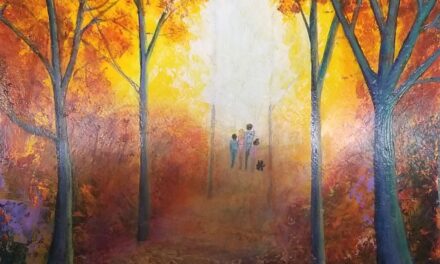Painting by Belynda Wilson Thomas
The more you practice the art of thankfulness, the more you have to be thankful for. Norman Vincent Peale
Don’t worry, be happy. We’ve all heard it but it isn’t easy to calm our mind when something keeps going round and round. I was listening to a speaker (I can’t recall her name) on YouTube the other day. She said, “We need to be careful of what we say because what we say matters. To recognize what we are saying she recommended adding, “And I like it like that, or that’s just the way I like it.”
So when we say we are fat, and add silently, and that’s just the way I like it, maybe we will change what we say to something we do want. “I’m healthy and getting healthier would be a better thing to say. I’m working on my fitness. What if we took our negative self-talk and flipped it to the positive? What if we count our blessings instead of our fears?
Can this make a difference in our lives, relationships, and mental health? How hard is it to shift our inner dialogue from negative to positive and start focusing on the positive?
What if we silently added, “And that’s just the way I like it,” to some of the thoughts going around in our head, would we realize if we are going to be happy with what we are thinking we have to think about it differently?
We might have a problem that is overwhelming us, but focusing on the problem, instead of focusing on a solution, is part of the problem. Perhaps we need to ask how could we improve this situation. Some situations can’t be made better but they must be dealt with and finding a positive way to go forward might be one of the hardest things we will do in our lives but we still have to do it.
I am happy because I’m grateful. I choose to be grateful. That gratitude allows me to be happy. Will Arnett
How do we go forward after losing someone? We need to figure this out because we will all lose people in life. Can we focus on what they brought to our lives and how lucky we were they were a part of our lives, the blessings they brought instead of the empty hole left by their leaving?
Sometimes we ask questions like, what if the worst thing happens, but what if instead, we asked, how can I prepare, how can I improve the situation? It might take some thinking and maybe a piece of paper to work out a positive framework for our feelings. How does our statement change if we exchange should to could, and what to how?
Byron Katie in “Loving What Is” tells us to ask four questions:
Question One: Is it true? What is the reality of it? Whose business is it?
Question Two: Can you absolutely know that it’s true? When do you think that it’s true? And it means that __________. What do you think you would have if reality were (in your opinion) fully cooperating with you? What’s the worst that could happen? What’s the should? Where’s your proof?
Question Three: How do you react when you think that thought? Can you think of one stress-free reason to keep the thought?
Question Four: Who would we be without the thought? The turnaround – as long as we feel that the cause of our problems is out there – as long as we think someone else is responsible for our suffering – and the situation is hopeless. It means we are forever the victim.
It might take real effort to turn our thoughts from negative to positive, to count our blessings instead of our fears, and to find a way to love the reality of our lives.
The only time we suffer is when we believe a thought that argues with what is. When the mind is perfectly clear, what is is what we want. If we want reality to be different than it is, we might as well try to teach a cat to bark. Byron Katie
Reality is what it is, and we can like it, or hate it, but what we can’t do is change it if it is not in our control, and part of what leads to suffering is when we can’t accept what we can’t control.
But, we can control a lot, and can we start by counting our blessings instead of our fears? If we get more of what we focus on, don’t we want more things to be grateful for?
As we express our gratitude, we must never forget that the highest appreciation is not to utter words, but to live by them. John F. Kennedy
Living in a state of gratitude is the gateway to grace. Arianna Huffington
Acknowledging the good that you already have in your life is the foundation for all abundance. Eckhart Tolle
Thank you for reading this post. Please return, read more, and have a blessed day filled with gratitude, joy, and love.

















